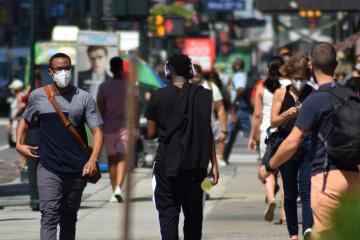
Promoting upward mobility in partnership with state and local governments: A blueprint for future evaluations

This blog post is the final piece in a series (see posts one and two) on how state and local governments in the United States can promote upward mobility in their communities. It is part of J-PAL North America’s work to develop a learning agenda that summarizes the core research priorities from state and local governments and provides guidance for concrete action.
Over the past five years, state and local governments submitted 124 research proposals to J-PAL North America’s State and Local Innovation Initiative that identify critical knowledge gaps in addressing pressing policy challenges. In the first post in this blog series, we provided a high-level overview of the themes that emerged from these research proposals. In the second post, we took a closer look at two policy areas—health and wellness, and gender and race—and how state and local governments proposed addressing issues that lie at the intersection of multiple policy areas. In this final post, we share findings from our completed mobility from poverty learning agenda.
This learning agenda is composed of findings from an analysis of past proposals, conversations with policymakers and researchers, and a discussion of ongoing or completed J-PAL supported evaluations. Through this work, we identified several key takeaways. In this blog post, we discuss one: state and local governments have broad policy priorities, but are flexible about ways to address them.
Our initial analysis of past proposals, discussed in the previous two blog posts, created a "demand map" of policy areas where state and local governments wanted to generate more evidence. The process of submitting proposals required state and local governments to share interventions that to a certain extent, were evaluation-ready, thereby limiting the pool of interventions highlighted in our previous analysis.
These proposals are only one part of the policy priorities story shared in the learning agenda. To get a more complete picture, we subsequently had conversations with state and local governments at varying levels of involvement in developing and implementing evaluations, and conversations with researchers in the J-PAL network. Some jurisdictions have not previously been involved in evaluations, while others were prepared to develop or implement a randomized evaluation, and some had even been previously involved in the evidence-based policy space. Those policymakers not currently involved with evaluations had broad policy priorities, but did not have specific interventions or evaluations in mind to address them. This flexibility to address policy priorities highlights an opportunity for state and local governments and researchers to partner to develop evaluations of promising interventions.
Within the agenda, we identify ongoing or completed randomized evaluations and highlight opportunities for potential future randomized evaluations within each policy area. Jurisdictions can look to each other for new and effective interventions and collaborate in learning through evaluations of these interventions.
By further investing in data infrastructure, state and local governments can explore potential research questions in their prioritized policy areas and better respond to the needs of individuals in their jurisdictions. Jurisdictions, researchers, and funders can use this learning agenda to effectively target resources on the most urgent questions and facilitate new government-researcher partnerships to generate rigorous evidence in these key areas.
It is critical now for state and local policymakers and researchers to work together to answer these key questions and the State and Local Innovation Initiative is excited to facilitate more of these relationships. J-PAL North America has provided a map for how we can address such questions through our technical assistance, funding, and resources like the Research Toolkit and Building Capacity, Overcoming Obstacles, and Creating Evidence: An Evaluation Guide for State and Local Policymakers. This learning agenda will help guide J-PAL North America and state and local governments’ research-generation efforts to launch new randomized evaluations to produce rigorous evidence that fosters greater mobility from poverty.
Read the full report with further details on core policy and research priorities for state and local governments, or visit the State and Local Innovation Initiative webpage for more information on our work supporting randomized evaluations.
Related Content

Promoting upward mobility in partnership with state and local governments: The intersection of gender, race, health, and poverty alleviation

Promoting upward mobility in partnership with state and local governments



